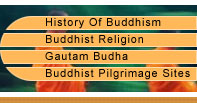Buddhism is a path of practice and spiritual development, providing a person with insight into the true nature of life. Buddhist practices, such as meditation, serve as the means of changing oneself, in order to develop the qualities of awareness, kindness, and wisdom. Buddhism is not about teaching or learning, but about experiencing.
Buddhist ideology does not advocate the practice of worshipping God in a physical form. Hence, quite often, it is not really seen as a religion in the normal sense. The basic tenets of Buddhist teaching are straightforward and practical - nothing is fixed or permanent; actions have consequences; change is possible. It teaches practical methods, such as meditation, which enable people to realize and utilize its teachings in order to transform their experience. They are taught to be fully responsible for their lives and to develop the qualities of wisdom and compassion.
There are over 360 million followers of Buddhism in the world. Even though they follow different forms of Buddhism, their traditions are characterized by the same values of non-violence, lack of dogma, tolerance of differences, and, usually, by the practice of meditation.
MEDITATION
Meditation is at the heart of the Buddhist way of life. It basically helps you in to attain a higher level of consciousness. We first learn to identify our negative mental state known as 'delusion', and then develop peaceful and positive mental state or 'virtuous mind'.
We overcome our delusions by becoming familiar with our virtuous mind. Later, we have to maintain the virtuous minds we have developed and use our wisdom to solve the problems of daily life. As our mind becomes more positive, our actions become more constructive and our experience of life becomes more satisfying and beneficial to others.
Anyone can learn basic meditation techniques and experience great benefits. However, the progress beyond basic meditation requires faith in the Three Jewels - Buddha, Dharma and Sangha. It is usually seen that this develops naturally as people experience the benefits of their meditation practice.
THE SPIRITUAL PATH
The teachings of Buddha reveal a step-by-step path to lasting happiness. By following this path, anyone can gradually transform his or her mind from its present confused and self-centered state to the blissful mind of a Buddha.
It is said that: "Every living being has the potential to become a Buddha, someone who has completely purified his or her mind of all faults and limitations and has brought all good qualities to perfection. Our mind is like a cloudy sky, in essence clear and pure but overcast by the clouds of delusions. "
Just as the thickest clouds eventually disperse, even the heaviest delusions can be removed from our mind. Delusions such as hatred, greed, and ignorance are not an intrinsic part of the mind. If we apply the appropriate methods, they can be completely eliminated and we will experience the supreme happiness of full enlightenment.
After attaining enlightenment, we will have all the necessary qualities - universal love and compassion, omniscient wisdom and boundless spiritual power - to lead all living beings to the same exalted state. This is the ultimate aim of Mahayana Buddhism.
India, being the birthplace of Gautam Buddha, figures as one of the most important places in Buddhism.
Information on Buddhism Religion, Buddhist Meditation, Buddhist Teachings and Buddhist History
Buddhist Temples: Buddhist Religion





